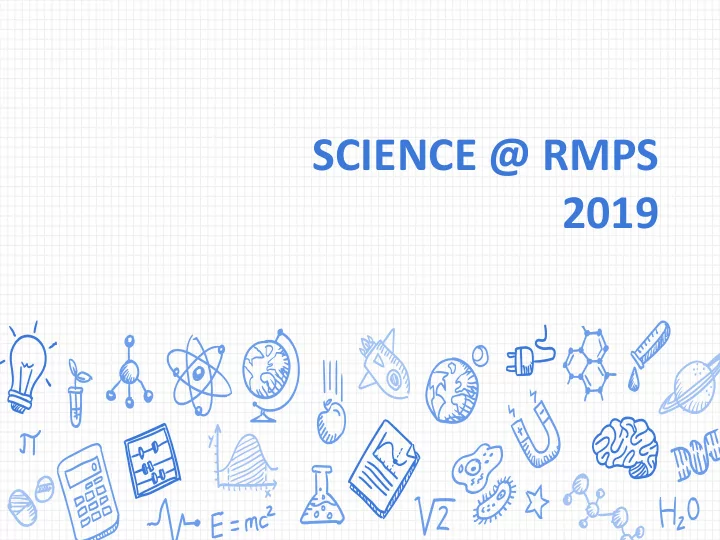

SCIENCE @ RMPS 2019
Vision An inquirer with a passion for Science. Mission o To develop students with an inquiring mind. o To equip students with scientific knowledge and skills. o To make the learning of Science fun, meaningful and relevant.
Science Curriculum Framework
Inquiry-based Learning Inquiry - based learning starts by posing questions, problems or scenarios rather than simply presenting established facts or portraying a smooth path to knowledge. The process is facilitated by the teacher.
• Scientific phenomena, facts, concepts and principles • Scientific vocabulary, terminology and Content conventions • Scientific instruments and apparatus including techniques and aspects of safety • Scientific and technological applications Ethics & Curiosity, Creativity, Integrity, Objectivity, Open- mindedness, Perseverance, Responsibility Attitudes Observing, Comparing, Classifying, Using Skills & Apparatus & Equipment, Communicating, Processes Inferring, Formulating hypothesis, Predicting, Analysing, Generating possibilities, Evaluating
Good content knowledge is not enough… Content Knowledge + Skills and Processes (Scientific Method and Experimental Design) + Application and articulation of concepts into authentic situations
What is Conceptual Understanding? • Conceptual understanding requires students to organise facts and ideas into a meaningful concept and making connections in science. • Moving beyond rote memorisation of facts. Therefore, students can apply their understanding of concepts to multiple contexts . (Kang, N. G., & Howren, C., 2004)
• While there are certain scientific terms and concepts taught, pupils can demonstrate their understanding by using their own words. • The focus of learning science is not on giving “standard answers” or keywords, but on developing students’ ability to inquire, understand and explain scientific phenomena. (Mr Sng Chern Wei, Director, CPDD1 From The Straits Times Forum, May 09, 2015)
• The learning of science does require a certain level of clarity though , in the way concepts are explained, given the context of the question . • Otherwise, we may end up endorsing misconceptions in students or rewarding them for ambiguous responses. (Mr Sng Chern Wei, Director, CPDD1 From The Straits Times Forum, May 09, 2015)
Strategies • Read the questions carefully . • Identify key phrases and words in the question stem before attempting to answer. • Identify the concept tested. • Model answering techniques. • Reinforce use of Concept – Apply – Link (CAL) answering technique.
Primary Science Syllabus Overview Themes Lower Block (P3 & P4) Diversity Diversity of living and non-living things • Diversity of materials • Cycles Cycles of plants and animals (Life cycles) • Systems Plant system (Plant parts and functions) • Human system (Digestive system) •
Assignments • P3 Package • Worksheets (filed in the Science file) • Practice papers before SA1 / SA2 * Please keep the P3-P6 work for revision!
Assessment • Paper format SA1 SA2 1 hour 1 hour 30 minutes 50 marks 80 marks Booklet A: 15 questions Booklet A: 24 questions Booklet B: 6-8 questions Booklet B: 10-12 questions • Practical Test 10 marks, 5% of SA2
Assessment SA1 Topics SA2 Topics • Diversity of • All SA1 Topics • Plant and Animal Living things and Non-living things Cycles • Diversity of • Plant and Animal Materials Systems
Parents as Facilitators Speaking Doing Visiting Reading
Speaking Language used in Science is very often different from our day-to-day language. Why X is a bird? It can fly. • X
Speaking Concept : Characteristics of bird • It has feathers, a beak and a pair • of wings.
Doing Keeping small Growing animals Green beans • Mealworms • Chili seeds • Fish • Peanuts • Crayfish • Bread mould • Snails • Mould on • Bear in mind – • oranges responsibilities involved in pet ownership
Doing – E.g. growing green beans Science Concepts : Living things need food, air and • water. What are the conditions needed for • germination? How can I prevent my green bean • from germinating? When does the developing seed • need sunlight?
Doing – E.g. growing green beans Plants need sunlight to make their • own food. Plants can reproduce from seeds. • How to conduct a fair test? • And more … • Observing, Comparing, Classifying, Using apparatus and equipment, Communicating, Predicting, Formulating Hypothesis
Visiting • Singapore Zoo / Night Safari / River Safari • Jurong Bird Park • S.E.A. Aquarium, Sentosa • Marina Barrage • Artscience Museum • Kranji Farms • Parks (E.g. Hortpark) • Gardens by the Bay • Sungei Buloh Wetland Reserve • Singapore Science Centre • Everywhere and Anywhere!
Reading • Science Books • Newspapers • Magazines • Youtube channel: • https://www.youtube.co m/user/1veritasium • MythBusters: http://dsc.discovery.com/ tv-shows/mythbusters
Our Contacts HOD Science Mrs Goh Hean Mei chan_hean_mei@schools.gov.sg LH (Science) Mdm Soh Xinyi soh_xinyi@schools.gov.sg
Thank you.
Recommend
More recommend